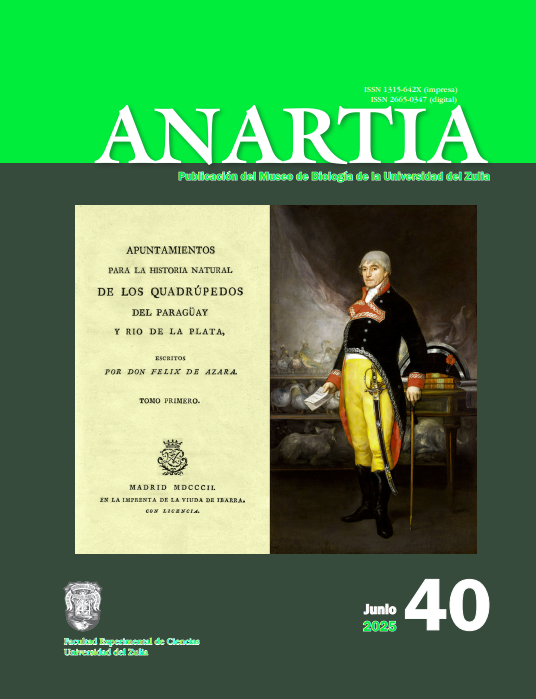The correct name of the Uruguayan Colocolo is Leopardus munoai (Ximénez, 1961) (Mammalia, Carnivora, Felidae), not L. fasciatus (Larrañaga, 1923), and the designation of a neotype for the latter is invalid
El nombre correcto del Colocolo Uruguayo es Leopardus munoai (Ximénez, 1961) (Mammalia, Carnivora, Felidae), no L. fasciatus (Larrañaga, 1923), y la designación de un neotipo para este último es inválida
Abstract
Members of the Pampas Cat species group are small felids specialized for life in open habitats. Their taxonomic history is complex, and they were divided into five species recently. In the case of one of the species, the Uruguayan Colocolo, there is a recent controversy between authors who either argue that its valid name is Leopardus munoai (Ximénez, 1961), or that it is L. fasciatus (Larrañaga, 1923). A revision and reinterpretation of the original sources for these names, namely Azara (1801, 1802), Desmarest (1816), and Larrañaga (1923) confirms the correct name of the Uruguayan Colocolo to be L. munoai. The neotype of L. fasciatus is invalid because: 1) as a nominal species, L. fasciatus is not a senior synonym of L. munoai, as it was assumed by those who designated the neotype, but instead it is a junior synonym of the Southern Pampas Cat, L. pajeros (Desmarest, 1816); and 2) the designation of the neotype involved errors typified as causes of invalidity in Article 75 of the International Code of Zoological Nomenclature.
Downloads
References
Astorquiza, J. M., E. A. Noguera-Urbano, C. Cabrera-Ojeda, B. Cepeda-Quilindo, J. F. González-Maya, E. Eizirik, A. Bonilla-Sánchez, D. L. Buitrago, P. Pulido-Santacruz & H. E. Ramírez-Chaves. 2023. Distribution of the northern pampas cat, Leopardus garleppi, in northern South America, confirmation of its presence in Colombia and genetic analysis of a controversial record from the country. Mammalia 87: 606– 614. https://doi.org/10.1515/mammalia-2022-01
Azara, F. de. 1801. Essais sur l’Histoire naturelle des quadrupèdes de la Province du Paraguay. Tome Premier. Paris: Charles Pougens, lxxx + 366 pp.
Azara, F. de. 1802. Apuntamientos para la historia natural de los quadrúpedos del Paragüay y Rio de la Plata. Tomo Primero. Madrid: Imprenta de la Viuda de Ibarra, xix + 318 pp.
Cabrera-Ojeda, C. & J. Meléndez. 2024. Nuevo registro del gato de las pampas de Garlepp (Leopardus garleppi, Matschie, 1912) en el valle del Patía, Colombia. Mammalogy Notes 10: 452. https://doi.org/10.47603/mano.v10n2.452
Desmarest, A. G. 1816. CHAT, Felis, Linn., Briss., Schreb., Cuv. pp. 73–123. In: Nouveau dictionnaire d’Histoire naturelle. Tome VI. Paris: Deterville.
Distel, A., M. S. Di Bitetti, S. Cirignoli, Y. E. Di Blanco & J. A. Pereira. 2023. The last stronghold of Muñoa’s Pampas cat (Leopardus munoai) in Argentina? Journal for Nature Conservation 74: 126449. https://doi.org/10.1016/j.jnc.2023.126449
García-Perea, R. 1994. The Pampas cat group (genus Lynchailurus Severtzov, 1858) (Carnivora, Felidae), a systematic and biogeographic review. American Museum Novitates 3096: 1–36.
González, E. M. 2001. Guía de campo de los mamíferos de Uruguay: introducción al estudio de los mamíferos. Montevideo: Vida Silvestre Uruguay, 340 pp.
González, E. M. & J. A. Martínez-Lanfranco. 2010. Mamíferos de Uruguay: guía de campo e introducción a su estudio y conservación. Montevideo: Ediciones de la Banda Oriental, 464 pp.
ICZN [International Commission on Zoological Nomenclature]. 1999. International Code of Zoological Nomenclature, Fourth Edition. London, UK: International Trust for Zoological Nomenclature, xxix + 126 pp.
Kitchener, A. C., Ch. Breitenmoser-Würsten, E. Eizirik, A. Gentry, L. Werdelin, A. Wilting, N. Yamaguchi, A. V. Abramov, P. Christiansen, C. Driscoll, J. W. Duckworth, W. E. Johnson, S.-J. Luo, E. Meijaard, P. O’Donoghue, J. Sanderson, K. Seymour, M. Bruford, C. Groves, M. Hoffmann, K. Nowell, Z. Timmons & S. Tobe. 2017. A revised taxonomy of the Felidae. The final report of the Cat Classification Task Force of the IUCN/SSC Cat Specialist Group. Cat News Special Issue 11: 1–80.
Klappenbach, M. A. 1997. Larrañaga naturalista. Algunos aspectos poco conocidos de su obra. Revista del Instituto Histórico y Geográfico del Uruguay 27: 287–304.
Larrañaga, D. A. 1922. Escritos de Don Dámaso Antonio Larrañaga. Tomo I. Montevideo: Instituto Histórico y Geográfico del Uruguay, xxiii + 439 pp.
Larrañaga, D. A. 1923. Escritos de Don Dámaso Antonio Larrañaga. Tomo II. Montevideo: Instituto Histórico y Geográfico del Uruguay, 512 pp.
Larrañaga, D. A. 1924. Escritos de Don Dámaso Antonio Larrañaga. Tomo III. Montevideo: Instituto Histórico y Geográfico del Uruguay, xix + 306 pp.
Martínez-Lanfranco, J. A. & E. M. González. 2022. The oldest available name for the pampas cat of the Uruguayan Savannah ecoregion is Leopardus fasciatus (Larrañaga 1923). Therya 13: 259–264. https://doi.org/10.12933/therya-22-1187
Nascimento, F. O., J. Cheng & A. Feijó. 2021. Taxonomic revision of the Pampas Cat Leopardus colocola complex (Carnivora: Felidae): An integrative approach. Zoological Journal of the Linnean Society 191: 575–611. https://doi.org/10.1093/zoolinnean/zlaa043
Wozencraft, W. C. 2005. Order Carnivora. pp. 532–628. In: Wilson, D. E. & D. M., Reeder (eds). Mammal species of the world, 3rd Edition. Baltimore, USA: Johns Hopkins University Press.
Ximénez, A. 1970. Notas sobre félidos neotropicales I: Felis colocola braccata y sus relaciones com Felis colocola munoai y Felis colocola pajeros. Comunicaciones Zoológicas del Museo de Historia Natural de Montevideo 10: 1–6.
Ximénez, A., A. Langguth & R. Praderi. 1972. Lista sistemática de los mamíferos del Uruguay. Anales del Museo Nacional de Historia Natural de Montevideo 7: 1–49.
Yanega, D., T. Pape, F. Welter-Schultes, J.-I. Kojima, N. L. Evenhuis, F.-T. Krell, M. J. Grygier, S. T. Ahyong, A. Ballerio, P. Bouchard, F. E. Rheindt, D. A. Dmitriev, M. S. Harvey, G. Lamas, R. L. Pyle, B. Halliday & Z.-Q. Zhang. 2018. When zoological type specimens are lost: ICZN-compliant guidelines for when and when not to designate neotypes Version 12-ix-2018. http://dx.doi.org/10.13140/RG.2.2.17568.51201










